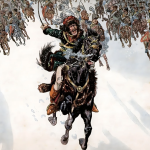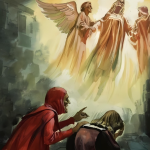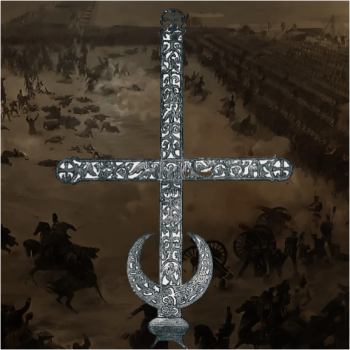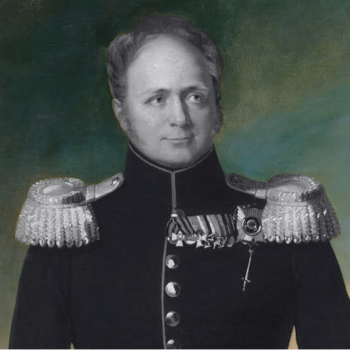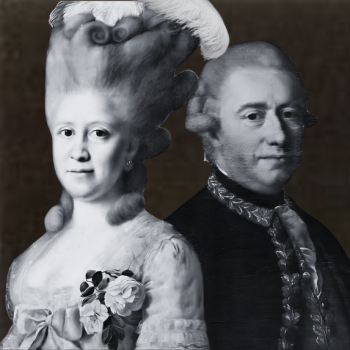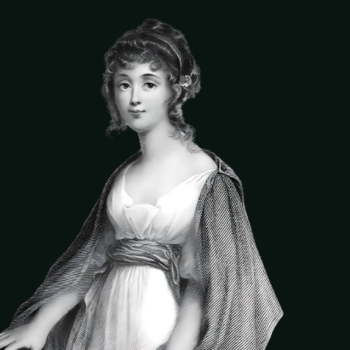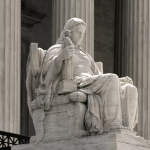A Tournament Of Shadows:
XIV. A Raft On The Neman
On March 9, 1807, General Bertrand was sent again with a flag of truce to General Levin August von Benningsen at the Russian outposts. It was refused. Benningsen, who had one distinction at the recent Battle of Eylau, would not undertake any further operation until the arrival of Tsar Alexander Pavlovich. He expected, with confidence, either a junction with Austria or peace. It was not then known that Russian success had made Austria become, in reality, an ally of France. (After Eylau, Austria had allowed Napoleon to send reinforcements through her territory to operate against the Russians in Dalmatia.) Meanwhile, British envoys at the Courts of Memel and St. Petersburg were given particular instructions to urge Russia to stay in the war.
Alexander Pavlovich passed a few hours at Mittau on his way to Prussia. While there, he went through the hospitals, crowded with the sick and wounded from both armies, and comforted him in what ways he could. He paid a visit to the Comte de Lille and his family. The brother of King, the last king of the Ancien Régime, after the Dauphin died, he took the title King Louis XVIII of France and went to Prussia where he obtained asylum. The pretender to the crown of France was met with more misfortune, however, as the French Directory required the King of Prussia to send the exiled Bourbon away. In vain Louis XVI sought asylum in the States belonging to the King of Saxony. Tsar Pavel Petrovich, with his mercurial temperament, entertained a violent hatred of France at the time and offered Louis XVIII refuge at Mittau. The late Tsar then changed his mind and exiled the Bourbon again. It was through the efforts of Alexander Pavlovich that Louis XVIII was again permitted to live in Mittau.[1] Alexander Pavlovich thanked the Duchess of Angoulême for her attention to the wounded which, however, was directed particularly to the French prisoners (among whom typhus prevailed extensively.) Without her title, the Duchess was Marie-Thérèse Charlotte, the eldest child of King Louis XVI and Queen Marie Antoinette. Though born in Versailles, her mother endeavored to instill a sense of humility in her. Among other exercises, Marie Antoinette instructed her daughter to use her needlecraft to make socks for the poor.[2]
The snow was unusually deep on the roads between Moscow and Vilna, St. Petersburg and Mittau, and the Tsar, traveling in an open sledge nearly died in a storm. He was compelled to pass the night in a peasant’s hut. At Memel Alexander Pavlovich was met by the Sovereigns of Prussia, King Frederick William III, and his cousin, Queen Louise of Mecklenburg-Strelitz (whose tired face spoke volumes.)
“Dear cousin…” were the only words the Queen could seem to say.
Alexander Pavlovich reassured her, and the same afternoon he had a three-hour discussion with the King on the subject of Napoleon’s proposal for a peace, which had been renewed with a letter: “I desire peace with Russia,” Napoleon stated, “and I desire to put a period to the misfortunes of your family, and organize as speedily as possible the Prussian monarchy, whose intermediate power is necessary for the tranquility of Europe.”
While a peace negotiation was pending between Russia and France, Napoleon tried to compel Tsar Alexander Pavlovich to turn his attention to the East. According to the existing treaties between Russia and the Ottomans, the Hospodars (Viceroys) of Wallachia and Moldavia could only be elected and deposed in concert with the Tsar. General Sebastiani, the French minister at Constantinople, urged Sultan Selim III to depose them for the purpose of dragging the two nations into war. The Ottoman Sultan was intimidated, and in June 1806 he prevented Russian vessels that carried troops from passing the Bosphorus. Three months later the Sultan sent an army into Wallachia and Moldavia and turned out the Hospodars. One of them was Alexander Ypsilantis, the Hospodar of Wallachia. He was a reformer whose policies favored Russia, as he hoped to gain her assistance in liberating Greece. As the Christian inhabitants of Moldavia and Wallachia were under the Tsar’s protection by a treaty, Alexander Pavlovich immediately ordered General Michelsen to occupy those provinces with 40,000 men. The British Resident at the Sublime Porte induced the Sultan to reinstate the Hospodars, but the news did not reach St. Petersburg in time to stop the Russian march. Sultan Selim, yielding to the persuasions of Sebastiani, declared war on Russia on December 27, 1806. Sebastiani then prevailed on the Ottoman Sultan to enact further measures on Russia. This resulted in Russian ships being forbidden in the Dardanelles, consequently stagnating trade in Odessa. The terms Alexander Pavlovich required from Napoleon in the peace treaty, before their diplomatic relations could be renewed, included the French evacuation of the Turkish territory of Albania (in addition to the clauses relating to the abandonment of Dalmatia and Sicily, and an indemnity for the King of Sardinia.) The trouble in Wallachia intensified a few weeks after the Battle of Eylau when, in March 1807, the eighty-five-year-old Prince Ypsilantis was beheaded by the Ottomans. (His son escaped to Russia.) General Michelsen, not being strong enough for active operations, remained on the defensive for some time. He later formed a junction with Dorde “Black George” Petrovic, a Serbian revolutionary who had defeated the Ottomans in several past engagements. Before the end of the year, the Russians possessed the whole north of the Danube, and laid siege to Belgrade. Nothing, however, could be more inopportune than this campaign, which occupied Russia’s best troops while hostilities were about to open on behalf of Prussia. If the Tsar removed the troops in this region and left the neighboring kingdom to her fate, it would surely make a permanent impression on the Ottomans. At the same time, the Tsar could not entirely withdraw from the Turkish War without endangering his southern provinces (only recently annexed to Russia,) and still peopled by Muslims. Retreat, no doubt, would have been regarded as weakness and likely followed up with further aggressions on the part of the Turks. He could not abandon the Christian population which he professed to protect to the wild fury of the Ottomans. Spurred on by Sebastiani, the Ottoman army (reinforced by French officers) crossed the Danube with 80,000 men. The Russian army in Wallachia, diminished by regiments sent to Poland, was compelled to retire from Belgrade in May 1807, and take up a defensive position in Moldavia. Stimulated by French promises, the Sublime Porte in Constantinople refused a proposal of peace on the part of Russia and even caused all British property to be confiscated and all British subjects to be made prisoners in the Ottoman Empire. The Sultan promised Napoleon that he would conclude no peace with Russia until he had obtained the restoration of the Crimea.
Did Russia ever have any direct interest in this war with Napoleon? The thought crept into the mind of Alexander Pavlovich. What did Russia gain from this conflict? Did he not refuse to proclaim himself King of Poland in 1805 when he expected Prussia to join the Allies? Did he not make the same refusal in 1806 when it was proposed by some of the Polish magnates? Did he not refuse that same crown for a third time in the winter of 1807? Why? Because he did not want to alienate Austria, whom he hoped to gain as an active ally, nor did he want to despoil Prussia (who clung tenaciously to her Polish territories) after coming to her aid. The Poles were becoming increasingly radicalized against Russia, emboldened by ideas introduced by the French. “The cause of Poland and the Poles was a right arm to Bonaparte,” it was said, “and never were a people more completely cajoled deceived with fairer promises or requited with more contempt.” The Tsar, raised on Enlightenment principles, was hardly unsympathetic. He was even unpopular with the nobles at this time on account of his planned measures towards the emancipation of the serfs. It was hardly surprising that his plans did not meet with approval in Russia, since the far more rigorous slavery of in the West Indies found advocates in the “enlightened” British Parliament.
A levy of recruits was raised in September 1806, in case of a war on behalf of Prussia. In December these militias were ordered to hold themselves in readiness throughout the country for the war with Turkey, as well as possible hostilities with Austria. This was a source of much discontent among the provincial nobility who had no interest in German affairs. They murmured at the troops not being concentrated on the Turkish border and ascribed the difficulties with France to foreign influence in the Russian Cabinet. There were many natives of the Baltic provinces holding a high position in the Russian Army, and they were looked upon “most unfavorably by the officers of pure Muscovite descent.” The idea of a German (like General Benningsen) being placed as second in command was reprobated by the old adherents of Tsar Pavel, among whom was ex-minister, Count Fyodor Vasilyevich Rostopchin. Fearing the liberal tendencies of Alexander Pavlovich, Rostopchin sent the Tsar a letter of warning and remonstrance:
The nobility are proud of the name of Russian and […] would sacrifice everything for their country. The militia just raised among them could offer a barrier to the world, but all these armaments, unheard of till now, will at once vanish if the desire of acquiring pretended liberty raises the people to overthrow the nobles, the sole object of the mob in all revolutions. This class of men will more easily give themselves up to excesses, as they have the recent example of the French, and you are preparing them for it by these fatal rights, which must lead to the destruction of the laws and of the sovereign. The measures taken to send foreigners from the empire only produce evil, for hardly one person out of forty would quit a country where every foreigner finds consideration and fortune. The French in Russia prefer to take the oath of naturalization from fear and avarice; in reality, it does not change their views, which would destroy Russia, as is shown by their insinuations to those bodies of men who are expecting Napoleon, as they imagine to bring them freedom. Sire, purify Russia, and only keeping the priests (of foreign worship,) order a crowd of wretches to be dispatched beyond the frontier, whose fatal influence corrupts the soul and spirit of your mistaken subjects. I fulfil a sacred task in exposing the truth to your eyes at a time when your heart renders justice to my sincere attachment. I implore you then, sire, to think of the past and present, of the treason of […] the philosophers.[3]
So long as this struggle continued, it injured Russia’s progress in Turkey, and was extremely detrimental to her real interests. For whom or for what had Russia impoverished herself and crippled her influence for years to come? For the smaller German States on the Rhine? They all joined Napoleon. They claimed as their reason that they “feared the progress of Russia.” In reality, these aristocrats were attracted by the titles and orders Napoleon bestowed among them, and the protection he afforded the German princes from the Republican proclivities of their own subjects. Then Russia wasted her resources in assisting Austria. How did this benefit Russia? The Austrians rewarded her by trying to deliver her army up to France, and after Eylau, when her cooperation would have crushed Napoleon forever, preferred to remain his vassal rather than assist in Russia’s triumph. How was Russia thanked expended the lifeblood of a hundred thousand of her sons striving to restore the Prussian monarchy? Prussia openly advocated an alliance and dependence on France rather than an alliance with Russia, evidently dreading the success of their allies more than that of the enemy. In many parts of Prussia, the Russians were treated worse than the enemy.
As for the British, had they not prevented the conclusion of peace at a most favorable moment? Could the cessation of hostilities early in the war saved the lives of thousands? The British Government was the first to stir his father, Tsar Pavel Petrovich, from a perfectly safe position, convincing him to mix Russia in the affairs of the Continent. It afterward played on the fears of the Russian ministers, inducing them to demand war by trying to make them believe that their country was endangered by Napoleon’s success. They asked Alexander Pavlovich to assist Prussia after Jena, and when affairs were at such a crisis that 20,000 British troops who were all ready to embark refused to make the smallest effort to assist the Allies. A few cargoes of guns or provisions, or even a loan, would have decided the contest at once. Since the beginning of the war, in 1798, Russia had not gained one ruble, nor one acre of land in Europe but, for the sake of furthering the public welfare, had missed a great opportunity for consolidating her power by strengthening her frontiers and enriching herself at very small expense. France and England, meanwhile, had extended themselves—the one in Europe, the other in India (and the French and Dutch colonial possessions in the East.) This was in addition to the incalculable wealth they acquired in the prizes they captured on both land and sea. Yet, somehow, thought Alexander Pavlovich, it was Russia who was looked upon as an aggressive power, “merely seeking to enslave instead of to liberate her allies.” He realized the situation for what it was. England feared Russian presence in Asia, and the Prussian and Austrian statesmen thought a weak Russia was the same thing as their own strength.
Nations, like people, were motivated by either love or fear. These were not lofty ideals they fought for, these were statesmen afraid of losing their status. As for fear, well it manifests in different ways. There are those who are frightening because one knows exactly what they are capable (such as Napoleon.) Then there are those who are frightening because one has no idea of what they’re capable of (as was the case with Alexander Pavlovich.) Was it really so strange that the Tsar no longer felt called upon to sacrifice Russia for such fickle and faithless allies. Did not first use him only to turn against him as soon as it suited their purpose?
The Neva was still frozen on May 10, and the protracted thaw in the central districts of the Russian Empire rendered the rivers impassable for many weeks. Famine and fever raged in the Prussian towns abandoned by the French. The Russian Army, assisting as they could, fed the inhabitants of Eylau and Heilsberg. General Benningsen and General Platov were both taken ill at a most inopportune moment, and the leaders of the Russian army deprecated any further offensive movements until they were reinforced. Alexander Pavlovich used the opportunity to encourage and reward his men. He marched with the Imperial Guards when they moved on towards Heilsberg, and at seven in the morning, he attended the exercises of the various battalions, presenting each man with an extra ruble when particularly satisfied with their maneuvers. Many were decorated with the newly established “Order of St. George.” He even reviewed the Tartar regiments and Cossacks in their national costume drenched in the pouring rain.
In May the Tsar went from Tilsit towards Vilna to ascertain what was causing a delay in the arrival of stores and troops. During his absence, the Russian commanders tried to end the campaign on June 10, by an engagement at Heilsberg, Constantine Pavlovich (and Generals Benningsen, Gorchakov, Bagration, Osterman, Rosen, Uvarov, and Chaplits,) commanded the Russians. Napoleon led the French (along with Marshals Ney, Oudinot, Soult, and Davout.) The French lost of between 12,000 and 20,000, while the Russians lost about 7,000. The Russians kept the ground, repulsing the French at four points, and took two standards. Hearing that Napoleon was about to be reinforced by 20,000 men, the Russians crossed the Alle and took up their station at Friedland (where their advanced cavalry drove out a French detachment.)
On June 13, General Benningsen, having received false information from some prisoners that Marshal Oudinot’s shattered division was alone in his front. Benningsen threw three pontoon bridges across the Alle. In spite of the extreme fatigue of his own army, he was determined to attack Oudinot. Benningsen thought, perhaps, he could secure victories over the isolated French units before Napoleon could bring additional forces. He was wrong. The Battle of Friedland was a dismal failure. On June 18, Benningsen, on his own authority, suggested an armistice. Napoleon acceded to it and sent the diplomat Charles Talleyrand to the Russian headquarters to recommend its extension (on certain conditions) for two months. Benningsen could not sign it for more than three days without Alexander Pavlovich’s authority. Then another diplomat was sent over, Géraud-Christophe-Michel Duroc, who said it would be easier and better to treat for peace at once with the Tsar, instead of merely for an extension of the armistice.
“My master wishes to make a separate peace with Russia,” said Duroc.
This was outright rejected.
Napoleon requested an interview with the Tsar, but Alexander Pavlovich refused. He did, however, sign an armistice for two months.
A conspiracy was brewing, headed by Constantine Pavlovich, Benningsen, and others, that resolved to compel the Tsar to make peace. “A cabal in fact, such as it would be difficult to conceive in any country but Russia or Turkey. A perfect tempest was raised up against him.”
The Prussian statesman, Karl August von Hardenberg, told the Tsar that Constantine was at the head of the party which meant to force him to make peace.
“You wish to sow dissension between my brother and I,” said Alexander Pavlovich angrily.
With these words, the Prussian Minister left him, determined never to visit him again. Three hours later, however, the Tsar sent for Hardenberg.
“I did you wrong,” said Alexander Pavlovich, “but who could suspect that my brother was so unnatural. He has been with me and had even the audacity to remind me of my father’s fate, but I shall find the means of removing him from my presence.”[4]
This meeting between siblings seemed violent. Owing to his hearing loss, conversations with the Tsar necessitated loud talking. A considerable part of their discussion, therefore, reached the ears of some Russian officer stationed outside his master’s door who thought a fierce altercation was taking place. Hardenberg was a surprise, then, when the following day the brothers appeared as perfectly good friends. The Tsar even consented to follow Constantine’s advice and accept Napoleon’s renewed invitation to meet him halfway between their headquarters. The vacillating British Government had indeed so angered the Tsar, that he decided to throw in with the French Emperor.
The interview between Alexander Pavlovich and Napoleon took place on July 7, 1807, at Tilsit, on a raft in the midst of the Neman River. On this raft was constructed a room, elegantly decorated, with two doors opposite each other. The roof was surmounted by two weather cocks, one displaying the double-headed eagle (the Russian coat of arms,) the other that of France.

Meeting of Napoleon I and Alexander I on the River Neman.[5]
The two Emperors embarked at the same moment, but Napoleon, having the best rowers, reached the raft first, and passing through the room, quickly positioned himself at the edge of the raft to receive the Tsar. A hundred-gun salute was fired the moment Alexander arrived where Napoleon was awaiting him. Napoleon, a master of the cajolery arts, won over Alexander Pavlovich from the very moment that they met.
“I hate the English just as much as you hate them,” said the Tsar.
“If that be so,” replied Napoleon, “then peace is soon made.”
This first interview lasted two hours, and Alexander Pavlovich was so fascinated by Napoleon, that he was prepared to have the town of Tilsit neutralized so that they might be enabled to meet more often.[6]
SOURCES:
[1] De Bourrienne, Louis Antoine Fauvelet. Memoirs Of Napoleon Bonaparte: Vol. II. Richard Bentley And Son. London, England. (1885): 409-410.
[2] Nagel, Susan. Marie-Thérèse: The Fate Of Marie Antoinette’s Daughter. Bloomsbury. New York, New York. (2009): 47.
[3] Joyneville, C. Life And Times Of Alexander I.: Emperor Of All The Russians: Vol. I. Tinsley Brothers. London, England. (1875): 317-318.
[4] Joyneville, C. Life And Times Of Alexander I.: Emperor Of All The Russians: Vol. I. Tinsley Brothers. London, England. (1875): 313-365.
[5] Adolphe Roehn (1808.)
[6] Baring-Gould, Sabine. The Life Of Napoleon Bonaparte. Methuen & Co. London, England. (1897): 368.


